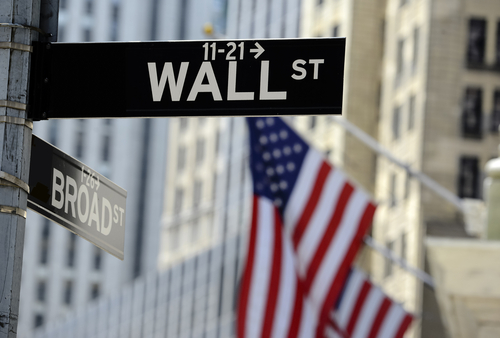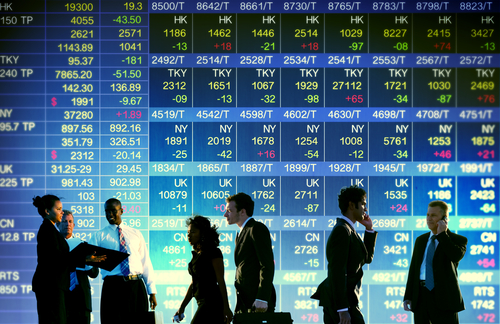
A Wall Street stockbroker’s salary can be high, but their salary is dependent on many factors. People who consider a career in this profession need an aptitude for finance, economics, and risk management, among other investment components. They must also have the knowledge, experience, and a fair amount of self-confidence to succeed. Luck is an asset, but it cannot compensate for a firm understanding of stock market trading.
What is the Stock Market?
It is necessary to understand what the stock market is to know how stock traders earn high salaries. Simply put, stock markets are places where investors buy and sell stocks. Most business pundits define the US stock market in terms of the exchanges. The biggest stock market exchanges are the New York Stock Exchange and the Nasdaq. There are a few other smaller ones as well.
A stock is a share of ownership in a company. Individuals do not customarily trade their stocks, however. Individuals buy and sell shares of stock through a brokerage firm. When the stockbroker receives the buy/sell order, then they make the trade.
Some traders work for traditional investment houses like Morgan Stanley, Fidelity, or Charles Schwab. Other traders may work for digital investment houses such as E*TRADE Financial, TD Ameritrade, and Ally Invest. Many of these online investment companies have emerged over the last five to ten years. They now command a large portion of stock market trading and allow smaller investors to participate.
These large institutional investors or small individual investors use brokerage firms to buy or sell stocks (or shares) in companies, depending upon how these companies are performing. The performance of a company is one of many indicators that determines the price of its stock. An investor may notify the investment representative in a brokerage firm that manages his portfolio that he wants to buy 1,000 shares of a company’s stock at $45 a share. The representative then notifies the floor trader, and that person tries to purchase the shares at that price.
According to Investopedia, people who buy or sell stocks in companies do not make these transactions directly from the companies themselves. They are buying from other investors in the stock market. That means over-confident buyers or fearful sellers drive the stock markets. One investment adage is that the investment pendulum always swings between fear and greed.
Stock market floor traders are usually “glued” to their computers and keep their phones handy because of the volatile nature of trading. An institutional investor who suddenly “dumps” millions of dollars of stocks in a company can cause panic selling. If the institutional investor buys millions of dollars of stock in a company, this can create a buying frenzy. Brokers must understand market trends and long-term investments. To avoid panic trading, a broker needs a lot of education and experience to make intelligent and timely trades.
Education Needed to be a Broker

Anybody can become a stockbroker. Those who want to become traders will need a bachelor’s degree that can be in any field. The prospective stockbroker should have a strong background in accounting, business, finance, and economics. They should take classes in macroeconomics, microeconomics, securities, risk management, accounting, and finance.
Many prospective stockbrokers serve internships. An internship is a popular way for someone who wants to become a stockbroker to get into the business. Brokerage firms will hire interns during their senior year in college and will offer a full-time position to the ones who are successful after they graduate.
Once a broker lands a position with a registered Financial Industry Regulatory Authority-registered company, they need to obtain several FINRA licenses by passing a series of exams before working as a stockbroker. These are the three most important exams for stockbrokers:
• The Securities Industry Essentials – The SIE is a general exam covering the basics of the securities industry. A prospective stockbroker must demonstrate a basic understanding of financial products, financial risks, structure and function of the securities industry, regulatory agencies, and prohibited practices.
• Series 7 – Passing this exam leads to a General Securities Representative license. This license allows a broker to sell any securities, including stocks, bonds, options, and fixed-income investments. The GSR license does not allow the broker to sell commodities futures, real estate, or life insurance.
• Series 63 – Passing this exam leads to a Uniform Securities Agent license. This license allows a person to work as a stockbroker and sell mutual funds.
Stockbrokers may choose to earn additional licenses to advance their careers. Some brokerage firms may require their stockbrokers to acquire one or more of these additional licenses. These licenses include:
• The Series 3 – This license allows a stockbroker to sell individual commodity futures contracts.
• The Series 31 – This license allows a stockbroker to sell a pool of commodity futures contracts.
• The Series 65 – Stockbrokers, financial planners, and other financial representatives who work with managed money accounts need this license.
• The Series 66 – This license is a combination of the Series 63 and Series 65 licenses. A stockbroker should check with their company to see if they need to take the Series 63 and Series 65 separately or only take the Series 66.
Before anyone starts a career as a stockbroker and takes these licensing exams, they need to make sure they can pass a criminal and credit background check. Passing a criminal and credit background check is a requirement for employment in a brokerage firm.
Preparing for the Licensing Exams
You can take the SIE exam before you are employed by a brokerage firm. You need to be employed by a brokerage firm to take the remaining tests. They need to sponsor you and file a Uniform Application for Securities Industry Registration or Transfer. This allows you to take the Series 7 exam. Before you take the Series 7 exam, take as many practices tests as you can so you will feel comfortable taking this exam. Employers typically provide new hires all the study materials they need to pass the Series 7 and Series 63 exams.
How They Work
Professional traders generally spend long days on the job. There is a lot of prep work before the trading day begins. Few people have not seen movies or documentaries of the rush that occurs when the “bell rings.” At that point, traders start receiving orders and assessing the markets. Much of the trading happens online. Traders also must meet with clients and attend broker meetings. They also do a lot of paperwork after the market closes for the day.
Stock markets are the financial infrastructure of the country. Careers as stock traders, especially Wall Street traders, are demanding and require considerable experience to understand the mobility of the markets and the comparative risks for investors involved in trading. That expertise and experience account for the comparatively high salaries traders earn.
While the top earners across the country might be corporate executives, some Wall Street stock traders give these professionals a run for their money in annual salary compensation. There is, of course, a bit of irony in this fact: The Wall Street stock traders are often responsible for a large share of a company’s accrued fortune, or lack thereof, during any given fiscal year. With such responsibility comes generous compensation, especially for those who have worked on Wall Street for years and have earned generous company bonuses for their dedication to their work.
The Wall Street Difference
So, what makes Wall Street different from other markets? Again, quoting Investopedia, Wall Street is arguably the “most important financial center in the world.” Some label it as a “fabled place of silver spoons and golden parachutes,” but it is also known as the “hub of cut-throat capitalism.” The upshot is that what happens on Wall Street impacts the entire globe.
The physical Wall Street only takes up a few blocks in lower Manhattan—less than a mile—of New York City. Wall Street got its name in the 17th century when Dutch settlers erected a wall to keep the British troops and pirates out of the area.
Today, Wall Street is home to large and small brokerage firms, commercial and investment banks, hedge funds, mutual funds, insurance companies, and other financial companies. Some of these businesses have headquarters in other parts of the country, but their presence in the New York exchange earns them a seat on Wall Street. Wall Street is considered the financial capital of America and the world.
Nationwide, a Rather Average Base Salary
One thing that is notable about trading stocks is that the world of Wall Street is worlds away from what stock traders earn in other parts of the country. Those who work on other stock exchanges, including those in San Francisco or Philadelphia, tend to make about half as much as their Wall Street counterparts. Salary.com pegs the lower 10 percent of stock traders’ salaries at about $43,200 per year. Those in the middle 50 percent earn a slightly higher salary, often around $57,600 each year. The highest earners nationwide, on average, take home $66,600 per year.
Those numbers are nothing to sneeze at since they are $10,000 to $20,000 more than the median American wage. Even so, they pale in comparison to the salaries earned by those who work in the country’s premier stock exchanges, including the New York Stock Exchange, the NASDAQ, and Standard & Poor’s.
Wall Street Broker’s Salary: A Bubble All Their Own

There is a reason why each stock trading job opening on Wall Street attracts thousands of highly qualified applicants. The median Wall Street broker’s salary for these positions starts at about $134,000 per year. Traders who are less experienced and newer to the field can earn this salary. Traders with years of experience can make a salary that easily averages about $224,000 per year. The top 10 percent of traders who work on Wall Street have salaries that approach $300,000 per year. According to the Bureau of Labor Statistics, this salary is nearly three times higher than the median executive wage.
One thing that is worth noting is that most Wall Street traders receive bonuses. Yet, they do not receive anything close to the stock options and other financial perks that most corporate executives receive. They do, however, receive healthy retirement packages or even pensions. Most traders have excellent health insurance packages that cover most of their healthcare needs with little money out-of-pocket. The same is not true of traders in other parts of the country or investors who work in other industries.
How They Get Paid
Some traders use their capital to buy and sell shares. These traders keep all the profits, but they also risk incurring losses. Traders who work for investment firms are paid based on the profits or losses they had that month. Traders in these firms typically have a considerable amount of buying power. Their earning potential can be much greater than they could have earned using their own money. They are paid a commission in addition to a regular salary.
At one time, all traders earned regular salaries. They took orders from the firms for which they worked and paid a set amount of money. Today, the highest-earning day traders work for companies that split the profits with them, some as high as 50/50 splits of the month’s end profits. Most of the higher-paying houses do not share the trader’s losses, but companies that pay smaller splits sometimes do.
Some traders earn high salaries and do not generally receive bonuses. This type of trader has emerged because more and more investments use the predictions of computer programs that model investments through data projections. Traders develop and run these computer systems and earn high salaries.
An Excellent Way to Earn Big and Control Corporate Fortunes

Wall Street traders make a lot of money because they always have their hands on the country’s economic pulse. Their moves determine the value of millions of 401(k) retirement plans, as well as college endowments, executive salaries, pension plans, and more.
People often say that great power demands great responsibility. When it comes to Wall Street investment work, great power typically results in truly excellent compensation, great annual benefits, and strong insurance policies that outshine what most people in the country use for their own needs. Without question, it is great to be a Wall Street trader at any level.
When people think of Wall Street, an image that emerges is the row of eager executives waiting for the starting bell to ring. Another is the instantaneous chaos that begins the moment the bell rings. There is a certain excitement in those images that are portrayed in films and on television. What is certain is that a Wall Street stockbroker’s salary pegs him as an economic rock star of the investment industry.
Related Resources:
